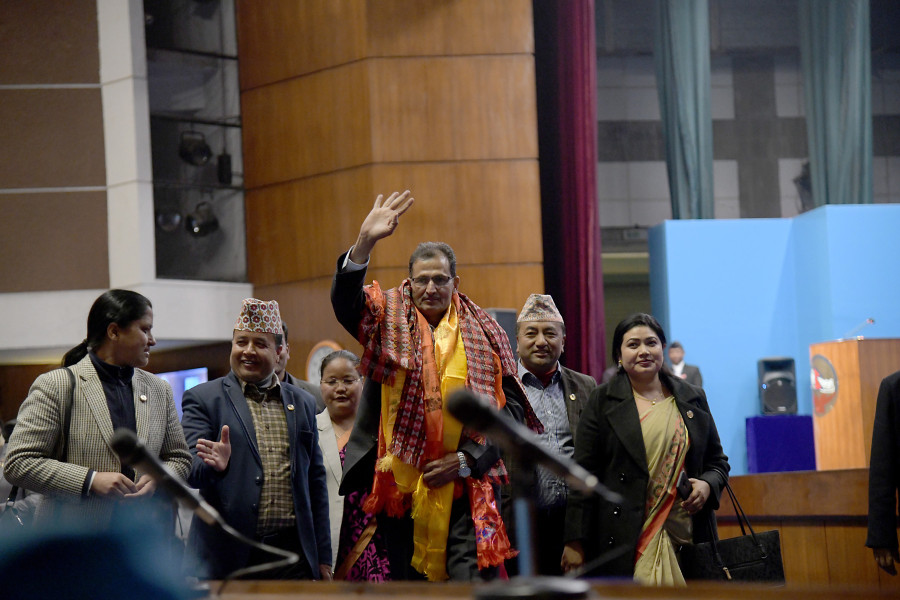Politics
Two weeks since Agni Sapkota became Speaker, there’s still no sign of his deputy
After exhausting all other options, the ruling party has no choice but to offer the deputy Speaker post to the Rastriya Janata Party, party insiders say.
Tika R Pradhan
The winter session of the House of Representatives commenced on December 20, but there was over a month-long wait before it could begin work.
At least three House meetings had to be deferred for the lack of Speaker, since Krishna Bahadur Mahara stepped down in early October following allegations of attempted rape. It was only on January 26, following an agreement between Nepal Communist Party (NCP) co-chairs KP Sharma Oli and Pushpa Kamal Dahal, that Agni Sapkota was elected the new Speaker.
Five meetings of the House of Representatives have been held since Sapkota’s election, but the House still lacks the deputy Speaker.
Both Janata Party and Nepal Communist Party insiders, as well as officials in the Parliament Secretariat and experts on parliamentary affairs, say the parties’ tendency to undermine the system has left the House without deputy Speaker.
In principle, it’s the Speaker, in his capacity as the leader of the House, who should show urgency in electing his deputy. But Sapkota, despite his election to the post of Speaker, which means he is above partisan politics, still appears to be looking to the ruling party to start the deputy Speaker election process.
“It’s difficult to say when the process to elect the deputy Speaker will begin,” said Gopal Nath Yogi, officiating general secretary at the federal parliament. “It seems that the election for deputy Speaker could be delayed by a few more weeks.”
The schedule and agenda for the House meetings depend on the role of political parties and unless they are ready, the House cannot move ahead, said Yogi.
In the absence of deputy Speaker, the Constitutional Council cannot meet and make decisions. The council, of which the deputy Speaker is one of its six members, is the body that appoints ambassadors and members to the constitutional commissions.
But the ruling party has proposed amending the law so that the prime minister can make decisions during the first meeting of the constitutional council, even in the absence of the deputy Speaker, say party insiders. As the deputy Speaker will be from a different party, the ruling party’s say on the council will be limited further, as the leader of the primary opposition is also a member of the council.
“The delay over deputy Speaker is possibly because talks with the Rastriya Janata Party have not been finalised yet,” said Rekha Sharma, a ruling party lawmaker and former minister. “The ruling party will certainly calculate its losses and benefits while supporting the deputy Speaker because she will also be a member of the constitutional council.”
The constitution mandates that the Speaker and deputy Speaker be of different genders and from different parties, which means that the latter cannot be a man or from the ruling Nepal Communist Party.
The Rastriya Janta Party is the most likely—and only, in the given context—party in the House to get the deputy Speaker’s post. But the ruling party appears unwilling to commit to the Janata Party.
The ruling party had proposed that Durga Poudel, the only lawmaker from Rastriya Janamorcha Nepal led by Mohan Bikram Singh, be deputy Speaker. However, Poudel refused, despite being elected through an alliance with the ruling party, as she is the only lawmaker from the party. Her elevation to deputy Speaker would leave the Janamorcha with no representation in Parliament.
The Samajbadi Party recently withdrew its support to the Oli administration and the Rastriya Prajatantra Party and Nepal Majdoor Kisan Party don’t have any women lawmakers. As the ruling party will not offer the post to the opposition Nepali Congress, it is now left with no option than the Rastriya Janata Party, say party leaders.
Ruling party leaders have thus been urging the Rastriya Janata Party to opt for a package deal that includes the deputy Speaker, but the Janata Party is adamant that issues related to Parliament be handled separately.
“We have told the leaders of the ruling party that the deputy Speaker won’t be part of a package deal,” said Mahanta Thakur, the senior-most leader of the Janata Party’s six-member praesidium. “A package deal could be reached on other issues, including amendments to the constitution and regarding the government, but not on issues related to the Parliament.”
Article 91 of the constitution says the elections of the Speaker and deputy Speaker should be concluded within 15 days of the first House meeting. The constitution, however, says nothing regarding the time frame for electing either the Speaker or the deputy Speaker when either post is vacant during the House session.
Former deputy Speaker Shiva Maya Tumbahangphe is especially chuffed at the delay, since the ruling party had accused her of holding up the House Speaker election when she refused to step down. Tumbahangphe had laid claim to the Speaker’s post on the grounds that she was the deputy and eminently qualified.
“Earlier, I was accused of being an obstacle but now, it appears that the leaders do not feel any urgency,” Tumbahangphe told the Post. “The Speaker should follow up for the election of deputy Speaker at the earliest.”
However, secretariat sources said that the Speaker is waiting for the parties to come up with a proposal.
“If we devise an election schedule without consulting with the parties, we will have to modify it later,” said Yogi. “The Speaker can do nothing without seeking approval from the political level.”
This is to be expected when the Speaker himself was elected on the lobby of some influential party leaders, said senior advocate Purna Man Shakya.
“Since the Speaker himself was elected with the support of some party leaders, we cannot expect him to act independently,” said Shakya.




 13.12°C Kathmandu
13.12°C Kathmandu














